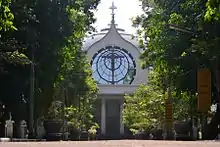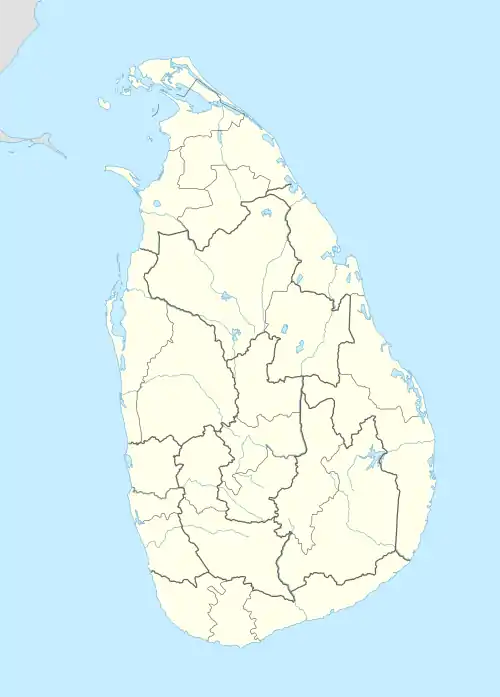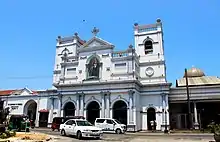| Basilica of Our Lady of Lanka | |
|---|---|
| Ragama Basilica/Tewatte Basilica | |
Sinhala: ලංකා අප ස්වාමිදුවගේ බැසිලිකාව | |
 Front view of the basilica | |
 Basilica of Our Lady of Lanka Location in Sri Lanka | |
| 7°02′01″N 79°56′06″E / 7.033593°N 79.935089°E[1] | |
| Location | Tewatte, Ragama, Sri Lanka |
| Country | Sri Lanka |
| Language(s) | Sinhala Tamil English Latin |
| Denomination | Roman Catholic |
| History | |
| Status | Minor Basilica National shrine |
| Founded | February 6, 1974 |
| Founder(s) | Jean-Marie Masson[2] |
| Dedication | Our Lady of Lanka(Mary Immaculate) |
| Architecture | |
| Functional status | Active |
| Architect(s) | Spanish architect Fr. Heras[3] |
| Groundbreaking | February 4, 1950 |
| Completed | February 6, 1974 |
| Administration | |
| District | Gampaha District |
| Province | Western Province |
| Archdiocese | Archdiocese of Colombo |
| Clergy | |
| Archbishop | Malcolm Ranjith |
| Auxiliary Bishop(s) | Maxwell Silva (2012–to date) Anthony Jayakody (2018 June–to date) Ranjith Pillainayagam (2020 July–to date) |
| Basilica of Our Lady of Lanka | |
|---|---|
 | |
| Religion | |
| Feast day | 4 February (same day the Independence of Sri Lanka is celebrated) |
| Specifications | |
| Direction of façade | North East |
| Length | 319 feet (97 m) |
| Interior area | 2,758.8 m2 (29,696 sq ft) |
| Height (max) | 125 feet (38 m) |
| Site area | 25 ha (62 acres) |
The Basilica of Our Lady of Lanka (Sinhala: ලංකා අප ස්වාමිදුවගේ බැසිලිකාව, romanized: Lanka Apa Swamiduwagay Bæsilikawa; Tamil: லங்கா மாதா பேராலயம், romanized: lanka matha peralayam) is a Roman Catholic basilica in Tewatte, Sri Lanka.[4] Being thus in a somewhat distant suburb of Colombo, it comes under the purview of the Roman Catholic Archdiocese of Colombo and is a site of pilgrimage for Sri Lankan Catholics. The church is home to the venerated statue of Our Lady of Lanka.[5]
History
Our Lady of Lanka started its life in 1911 as a small chapel dedicated to Our Lady of Lourdes (Mary Immaculate), France. It was built by a local pastor Fr. A. Kieger and a few Catholic laymen, as a part of the parish of Ragama at that time. In 1917 another pastor, Fr. A. Collorec had a grotto built for Our Lady of Lourdes, with the assistance of Catholic workers from Colombo. The growing popularity of the chapel led to the chapel being expanded into a church in the 1930s.
However, its true rise to fame occurred due to the former Archbishop of Colombo, Jean-Marie Masson. During the outbreak of the Second World War, Archbishop Masson made a vow that if Ceylon were to be protected from major conflict, he would build a Votive Basilica under the title Our Lady of Lanka. Ceylon was indeed spared from any major warfare. The archbishop was delighted and in 1946 he obtained approval from the then Pope, Pius XII, for the construction of a basilica in honour of Our Lady of Lanka.
Masson died the following year and his successor Archbishop Thomas Cooray took on the responsibility of ensuring his predecessor's vision was realized; In 1948 Pope Pius XII established the Mary Immaculate, to be known as Our Lady of Lanka, as the principal Roman Catholic patroness of the island. He then acquired a nearby rubber estate and had the basilica constructed on the amply-sized land. Many shady local trees such as Neem and Na were planted to give a place for future pilgrims to rest under.
On February 4, 1950, the cornerstone for the basilica was laid. It was completed in 1974, a year after Pope Paul VI endowed the church with the title of Minor Basilica. On February 6, 1974, the consecration of the basilica and crowning of the statue of Our Lady of Lanka took place; making it the national basilica and a national shrine of Sri Lanka.
Source:[6]
References
- ↑ "Coordinates of Tewatte Basilica".
- ↑ "Founder of Tewatte Basilica".
- ↑ "Architecture of Tewatte Basilica".
- ↑ "Story of Tewatte Basilica - Daily Mirror".
- ↑ "Story of Tewatte Basilica". Archived from the original on 2022-09-27. Retrieved 2022-09-26.
- ↑ "History of Tewatte Basilica".
